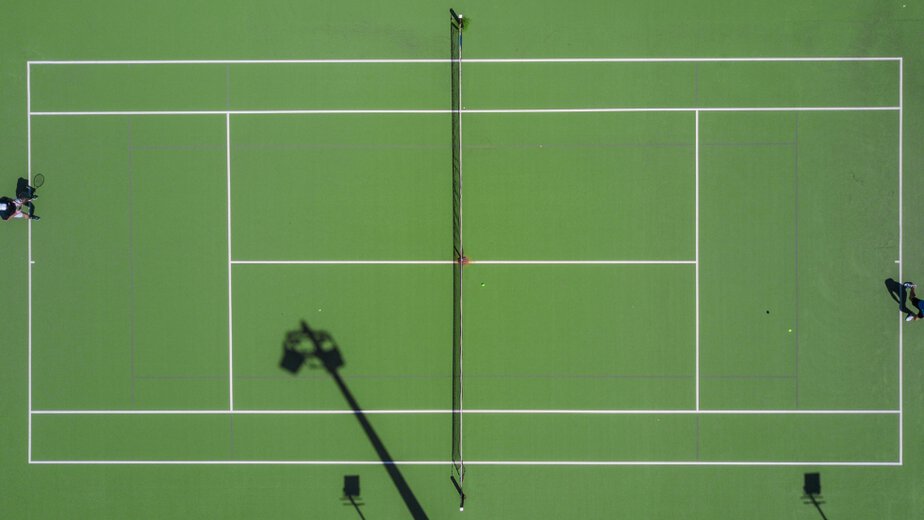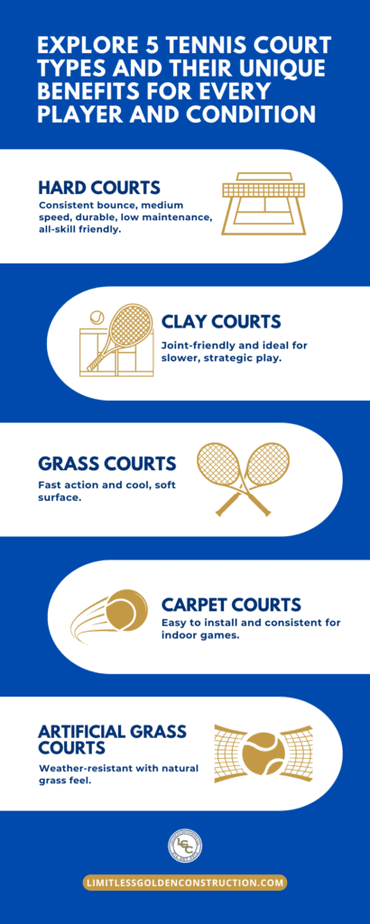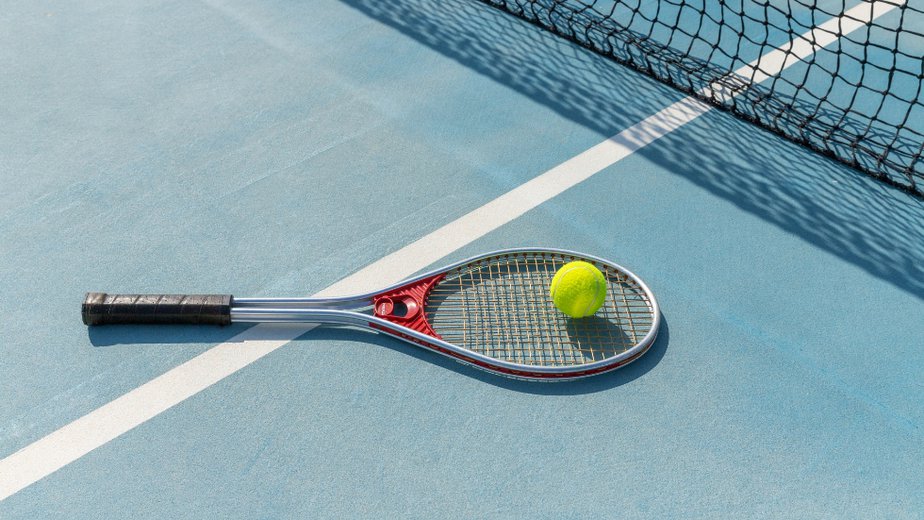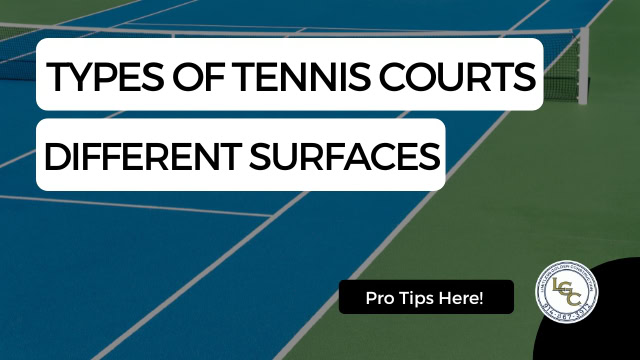Tennis, a sport synonymous with elegance and precision, is not just played on public courts or grand arenas. For those with the space and inclination, having a private tennis court at home can be an ultimate luxury. But it’s not just about picking a spot in your backyard. Choosing the right surface is crucial for gameplay and maintenance. This guide will explore the various types of tennis courts surfaces available, helping you find the best match for your home.

Understanding Different Types of Tennis Courts Materials
Before you start planning your home tennis court, it’s essential to understand the type of materials that make up these playing surfaces. Each type of court surface affects the ball’s speed, bounce, and the overall playing experience.
Types of Tennis Courts: A Variety of Surfaces to Choose From
Tennis courts are predominantly categorized into three types based on their materials: hard, clay, and grass. Each offers distinct characteristics and gameplay experiences. Knowing the differences will guide you in making an informed decision for your court.
Tennis Surfaces: The Impact of Materials on Gameplay
The type of material of a tennis court surface significantly influences how the game is played. Hard courts offer consistent bounce, while clay courts slow down the ball, making for longer rallies. Grass courts provide a fast-paced game with unpredictable bounces. Understanding these nuances is crucial for choosing a surface that complements your playing style, call us to get a free quote and understand the importance that the materials of a tennis court can have.
Popular Types of Tennis Courts
Now that you’re familiar with the basic materials, let’s explore the most popular types of tennis courts. Each type has its pros and cons, which we’ll discuss to help you decide what’s best for your property.
Hard Courts: Durable and Versatile Options
Hard courts are made from rigid materials like concrete or asphalt, topped with a resin layer. They’re incredibly durable, require less upkeep, and offer a medium-fast game pace. This versatility makes them suitable for players of all skill levels, making them a popular choice for commercial and residential properties.
Clay Courts: The Classic Choice for Professional Tournaments
Clay courts, often seen in professional tournaments like the French Open, are made of crushed shale, stone, or brick. They are known for their slower pace, allowing longer rallies. Clay courts demand regular maintenance to keep the surface level and free from debris but offer a unique playing experience that many enthusiasts love.
Grass Courts: The Traditional Surface for Wimbledon
Grass courts are the oldest type of tennis surface, famously used at Wimbledon. They offer a fast-paced game and a soft, comfortable playing surface. However, they require significant upkeep, including regular mowing and watering, to maintain their quality. Despite the high maintenance, grass courts provide an unparalleled traditional tennis experience.
If you already know which type of tennis court you want or need, you can book a fast and free quote.

Creating Your Own Type of Tennis Court
Building a tennis court at home might seem daunting, but with proper planning, it can be a rewarding project. Let’s look at the essential steps and considerations for creating your court.
Home Tennis Court: Building a Court in Your Backyard
Creating a tennis court in your backyard involves several steps, including site preparation, choosing the right surface, and ensuring proper drainage. It’s crucial to work with professionals like Limitless Golden Construction. We understand the nuances of constructing a tennis court to ensure longevity and performance.
Home Tennis Court Dimensions: Standard Sizes for Home Courts
Standard home tennis court dimensions are 78 feet long and 36 feet wide for doubles matches. However, you can adjust the size to fit your available space. Remember to include additional space around the court for player movement and safety.
Factors to Consider When Choosing a Type of Tennis Court
Choosing the right tennis court surface involves more than personal preference. Several factors can influence your decision, each worth considering to ensure your court meets your needs and expectations.
Climate and Weather: Selecting a Surface Suitable for Your Local Conditions
The Tri-State area’s climate can be harsh, with cold winters and hot summers. Hard courts withstand temperature fluctuations well, while grass courts may struggle. Consider how the local climate will affect the maintenance and usability of your chosen surface.
Gameplay Preferences: Considering Your Playing Style and Level of Skill
Your playing style and skill level can also influence your choice of surface. Beginners might prefer a hard court for its consistency, while more experienced players might enjoy the tactical challenge of a clay court. Think about the kind of games you want to play and choose a surface that complements that vision.
Maintenance Requirements: Assessing the Effort Needed to Maintain Your Court
Different surfaces require varying levels of maintenance. Hard courts are generally low-maintenance, needing regular cleaning and occasional resurfacing. In contrast, clay and grass courts require more frequent upkeep, such as regular watering or grooming. Consider how much time and effort you can dedicate to maintaining your court.
If you are still not sure if you are choosing the best type of tennis court, do it right and trust the professionals, schedule a call with us today.

Choosing the Right Surface for Your Home
In conclusion, selecting the perfect tennis court surface for your home involves balancing personal preferences, budget, and maintenance capabilities. Whether you’re drawn to the durability of hard courts, the classic appeal of clay, or the traditional allure of grass, understanding each type’s characteristics is key to making the most informed decision. With careful planning and consideration, you can create a home tennis court that enhances your property and provides endless enjoyment for years to come.
For those eager to begin but unsure of the best starting point, consulting with Limitless Golden Construction can offer invaluable insights and guidance tailored to your specific situation. Start your court-building journey today and bring your tennis dreams to life!


